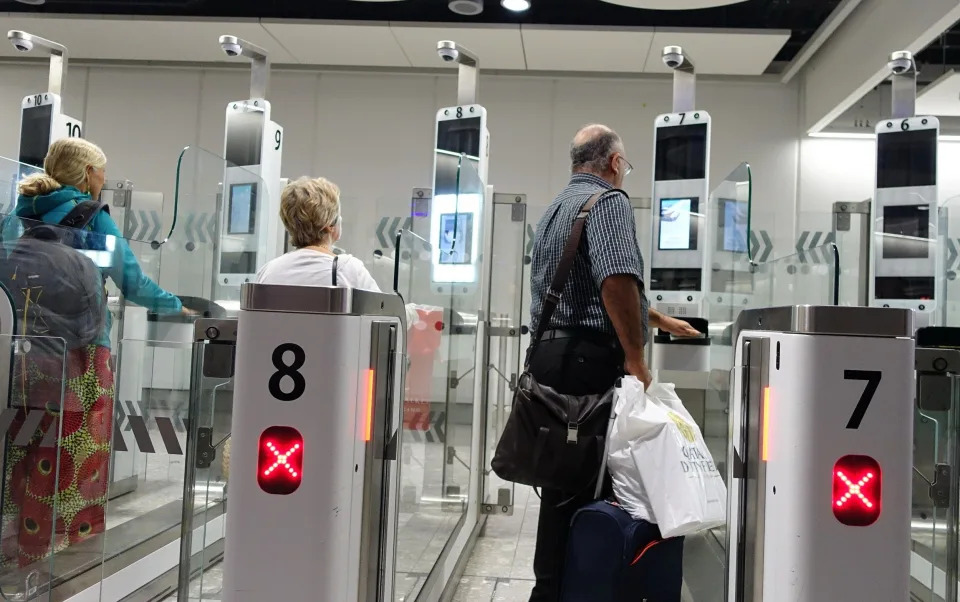The Metropolitan Police is investigating the Post Office over potential fraud offences after the wrongful prosecution of subpostmasters.
The police confirmed on Friday that it is looking into the handling of the Horizon IT scandal - "such as the monies recovered from subpostmasters as a result of prosecutions or civil actions".
Detectives are also separately looking into "potential offences of perjury and perverting the course of justice" in an investigation that was launched in January 2020.
Two people have been interviewed under caution, but nobody has been arrested.
Read more: The true story behind drama on Horizon IT scandal
Former subpostmasters and subpostmistresses were held liable by the Post Office for financial discrepancies thrown up by its computerised accounting system Horizon.
Faulty Fujitsu software made it appear as though money was missing from their outlets.
The Post Office's pursuit led to more than 700 prosecutions, criminal convictions and, in some cases, prison sentences.
Many of those pursued were told to plead guilty to crimes or face jail, according to lawyers who have represented dozens of those impacted.
They were forced to pay the Post Office money it claimed had gone missing, which meant many lost their jobs, homes and life savings.
It has been described as the most widespread miscarriage of justice in UK history, and a public inquiry into it is ongoing.
Read more:
Explainer: What is the Post Office scandal?
Post Office 'massively contributed' to subpostmaster death - widow
Victims of Post Office Horizon scandal offered £600k compensation
More than half a million people have signed an online petition calling for the former Post Office boss to have her CBE taken away over the scandal.
Paula Vennells later said she was "truly sorry" for the "suffering" caused to subpostmasters who were wrongly convicted of offences.
After ITV aired a drama into the scandal, Mr Bates vs The Post Office starring actor Toby Jones, 50 new potential victims have approached lawyers, it has been said
Post Office scandal: Petition to strip Paula Vennells of CBE signed by 600,000 people
Sky News
Updated Sat, 6 January 2024

In this article:
Paula Vennells
British businesswoman and Anglican priest
More than half a million people have signed a petition calling for the former Post Office boss to have her CBE taken away over the Horizon scandal.
Paula Vennells oversaw the organisation while it routinely denied there were problems with its Horizon IT system.
Demands for her honour to be removed have reemerged after ITV aired a new drama into the scandal, Mr Bates vs The Post Office, which tells how former subpostmasters and subpostmistresses were held liable by the Post Office for financial discrepancies thrown up by its computerised accounting system.
Police investigate Post Office over potential fraud offences
Their pursuit led to more than 700 prosecutions, criminal convictions and, in some cases, prison sentences.
A public inquiry into the scandal is ongoing.
Ms Vennells later said she was "truly sorry" for the "suffering" caused to sub-postmasters who were wrongly convicted of offences.
From 1,000 signatures to 350,000 in days
The ITV show has led to a surge of sympathy for the victims of the scandal and a rapid rise in the number of people signing the online petition, which was set up in 2021.
On Monday, when the first part was aired, it had about 1,000 signatures. By the time the final episode was broadcast on Thursday, the total had leapt past 350,000. So far, more than 600,000 people have signed it.
38 Degrees, the campaign group behind the petition, said that "many signatories [were] saying they'd been inspired to join the call by watching the drama," which "brought the long-running scandal to the attention of millions of people".
Robin Priestley, the group's campaigns director, said in a statement: "Paula Vennells keeping her CBE while many victims of the Horizon Scandal are still waiting for justice flies in the face of the fairer country we all want to see.
"The huge surge of public support for this campaign in the aftermath of Mr Bates vs the Post Office makes that very clear."
Read more:
The true story behind the drama on Horizon IT scandal
What is the Post Office scandal?
The prime minister on Thursday declined to say whether she should lose her honour.
"There's an independent process for honours forfeiture, which is done by an independent committee, so that's a separate process from government," Rishi Sunak said.
"But, more generally, my job is to make sure that we're putting in place the compensation schemes and all those people who were awfully treated, suffered an appalling miscarriage of justice, get the justice that they deserve, and that's what we're delivering."
Sir Keir Starmer told ITV News: "Whether she [Ms Vennells] hands back her award is really a matter for her.
"But I do think there's a more important point in many senses here, compensation for these victims is overdue."
Ed Davey must be held to account for ‘wicked’ ministerial decisions about Post Office, says victim
Hayley Dixon
Sun, 7 January 2024
In this article:
Ed Davey
Leader of the Liberal Democrats, MP for Kingston and Surbiton

Liberal Democrat leader Sir Ed Davey has tried to distance himself from the Horizon scandal - Andrew Matthews
Sir Ed Davey must be held to account for “wicked” Post Office decisions, a victim of the scandal has said.
The Lib Dem leader has tried to distance himself from the Horizon scandal, claiming he was “deeply misled” while serving as the postal affairs minister between 2010 and 2012.
But those falsely accused of wrongdoing are demanding that he is subject to a full interrogation over what he knew and when.
Ministerial decisions ‘wicked’
Ex-postmistress Sally Stringer has said that the root of the scandal “goes back to ministerial decisions” some of which were “wicked”.
In what has been described as one of the biggest miscarriages of justice in British history, more than 700 postmasters were prosecuted after faulty accounting software, called Horizon, made it appear money was missing from their stores.
Events surrounding the scandal are back in the spotlight following an ITV drama, Mr Bates vs The Post Office, which was screened last week.
It has since emerged that Sir Ed and other ministers were repeatedly warned about the accounting problems and issues with the software.

ITV drama Mr Bates vs The Post Office has brought the events back into the spotlight - ITV press centre
Campaigner Alan Bates ended up cutting contact with Sir Ed after he said in response to numerous complaints in 2010 that he had checked with the Post Office and it “continues to express full confidence in the integrity and robustness of the Horizon system”.
In a letter seen by the Sunday Times, Mr Bates responded in 2011 saying: “Having nailed your colours to the POL’s [Post Office Ltd] mast from the [Justice For Subpostmasters Alliance] standpoint there was little point in continuing a dialogue with you or your department at that point.”
‘Bitterly regrets’
A spokesman for Sir Ed has said that he “bitterly regrets” that the Post Office was not honest with him and “in hindsight” he wishes that he could have done more.
However, Mrs Stringer, who ran a post office in Beckford, Gloucs, for 20 years and faced audits, accusations and demands for repayment of money that was supposedly missing, believes that the responsibility for the scandal lies at the door of the Government.
“ I think the problems with Post Office Limited goes back to ministerial decisions taken during the coalition government of the Liberal Democrats and the Conservatives formed in 2010,” she said.
“The ministerial decisions range from incompetent to wicked.”
‘Interrogate’ Sir Ed
She has asked the ongoing public inquiry to “interrogate” Sir Ed as well as former business secretary Sir Vince Cable and Jo Swinson, who also held the position of postal affairs minister whilst prosecutions took place.
Giving evidence to the ongoing public inquiry, Mrs Stringer said the CEOs of the Post Office are “pawns” in the scandal as “they did as they were told by [the Department of Business]... They are all dysfunctional to the core, the whole lot, and they need to be accountable.”
She added: “ There has to be a concerted effort to get the responsible individuals. It needs to be done as a block, otherwise those responsible will walk away nicely. I would like Vince Cable and Edward Davey to be cross examined about what they knew and did.”
‘Completely understands victims’ anger’
A Liberal Democrat spokesman said that Sir Ed did meet with postmasters and raise concerns whilst minister in charge of the Post Office.
They added: “Ed completely understands the victims’ anger at this appalling miscarriage of justice, and in hindsight he wishes he could have done more to help them. His focus is now on getting justice and compensation as quickly as possible to all those affected.
“Ed deeply regrets not realising that the Post Office was lying to him and other ministers on an industrial scale in what amounts to a conspiracy against the public. He will fully cooperate with the inquiry and is keen to give his evidence as soon as possible to help get to the bottom of this scandal.”
Liberal Democrat MP and former leader Tim Farron said: “Ed has said how much he regrets that the Post Office was lying to him, just like it was to everyone else. He’s experienced more than his fair share of tragedy in his life, I know he feels the pain of those affected by this scandal very deeply.”
What is Ed Davey's connection to the Post Office Horizon scandal?
Sir Ed Davey's role as postal affairs minister is coming back to haunt him as he faces accusations of 'fobbing off' victims of the Post Office Horizon scandal.
James Hockaday
Sun, 7 January 2024

Liberal Democrat leader Sir Ed Davey is facing questions over his former role as postal affairs minister. (Alamy)
Liberal Democrat leader Sir Ed Davey is in the hot seat over his handling of the Post Office Horizon scandal during his time as a government minister.
Correspondence published by The Sunday Times shows how sub-postmaster Alan Bates grew increasingly frustrated as he wrote to ministers from three successive governments over the issue.
This included Ed Davey, who served as postal affairs minister between May 2010 and February 2012 under the Lib Dem-Conservative coalition government. Bates said Davey's response to his concerns were not only "disappointing", but "offensive" too.
Campaigning over the scandal, which saw 700 Royal Mail staff members prosecuted between 2000 and 2014 based on incorrect information on the service's computer system, has been running for several years now.
However, ITV's recent drama Mr Bates vs The Post Office has thrust the issue back into the spotlight, with a petition to strip the postal service's former boss of her CBE passing 900,000.
Recommended reading
Ed Davey: I was misled by Post Office bosses over Horizon scandal (The Telegraph)
Government considers fast track appeals for wrongly convicted Post Office branch managers (The Independent)
Post Office scandal: Met Police launches investigation as petition to strip ex-boss of CBE passes 900,000 (Yahoo News)
With Ed Davey's record during the scandal also being brought into scrutiny, here's what we know about his role at the time.
Why is Ed Davey under pressure?
Ed Davey is facing questions over his role as postal affairs minister at a time when concerns were being raised over postmasters being wrongly incriminated due to errors by Horizon, a Post Office computer accounting system created by Fujitsu.
In a letter in May 2010, Bates urged Davey to intervene and push for an independent external investigation, The Sunday Times reported. He said: "The evidence is there to be found by anyone in a position of being able to unlock doors instead of placing barriers in the way of those pursuing the information."
Responding bluntly, Davey said the integrity of the Horizon system is a matter for Post Office Ltd and not the government. He added: "Whilst I do appreciate your concerns... I do not believe a meeting would serve any useful purpose."
Taken aback, Bates wrote back claiming that Davey's "arm's length" approach had enabled the Post Office to "carry on with impunity regardless of the human misery and suffering they inflict". He added: "You can meet with us and hear the real truth behind Horizon."
The Sunday Times reported that the pair met after this exchange, but when Bates subsequently wrote back to warn Davey of "yet another victim", the minister said he "made clear in the meeting" that neither he nor the Department for Business could step in before a legal judgement had been reached.
What backlash has Davey received?
Davey, and the Lib Dems in general, have been accused of "fobbing off the victims of Post Office miscarriages of justice" by SNP MP Joanna Cherry, who added: "With government comes responsibility."
She said that successive Conservative governments "shouldn't be off the hook", adding that it "falls on them to finally sort this out".
Speaking to GB News on Sunday, former BBC chief political correspondent John Sergeant suggested the Liberal Democrat leader's position was "crumbling" as a result of the scandal, adding: "I think it will come up time and time again, the role that he played."
The veteran journalist said that having attempted to palm the issue off as a Post Office matter, independent of any ministerial responsibility, Davey's position "completely crumbles" now that the government has conceded it has to pay compensation to victims.
Raising questions for Davey on Times Radio, Bates said: "I'd quite like to know how much briefing did Post Office executives do to him beforehand to steer him away from meeting with ourselves? What was said at that time? Why didn't he meet with us?"

Former Post Office chief executive Paula Vennells is facing calls to hand back her CBE. (PA)
How has Davey responded?
Responding to Bates's question, Ed Davey told Times Radio: "I regret not doing more. I feel, to be honest with you, I was deeply misled by Post Office executives. Alan is right to raise the point – they didn't come clean, and there were definitely attempts to stop me meeting them and I regret that we didn't do more, but we were clearly misled."
Asked about Post Office executives, Davey said: "Now they're dragging their feet, they're not bringing forward evidence to the inquiry and that is just outrageous given that there are postal masters getting older, some are even passing away sadly."
Davey said there were people "down the chain" from the chief executive who were "trying to prevent ministers and the wider public from knowing what was going on". He added: "I think they probably kept a lot of facts away from officials as well in the department."
A Liberal Democrat spokesperson said: "Ed's heart goes out to the families caught up in this scandal and his focus is on getting justice and compensation for those impacted. Not realising that the Post Office was lying on an industrial scale is a huge regret. Ed will fully cooperate with the inquiry to get to the bottom of what went wrong."
Mr Bates vs The Post Office: Sunak condemns 'appalling miscarriage of justice' of Horizon scandal
Sky News
Updated Sun, 7 January 2024

Rishi Sunak has condemned the Post Office Horizon scandal as an "appalling miscarriage of justice".
The prime minister also said ministers were examining whether to prevent the under-fire organisation from carrying out prosecutions or investigations in relation to the IT scandal.
The controversy has hit the headlines again following the airing of the TV drama, Mr Bates vs The Post Office.
Hundreds of people were held liable for financial discrepancies thrown up by faulty Fujitsu accounting software that made it appear as though money was missing from their branches.
This led to more than 700 convictions, criminal prosecutions and - in some cases - prison sentences. Dozens of victims died before they saw justice.
Speaking to broadcasters, the prime minister said: "This has been an appalling miscarriage of justice, an appalling treatment of all the people affected, and it's right that they get the redress that they deserve."
And Justice Secretary Alex Chalk is examining how to exonerate hundreds of subpostmasters and sub-postmistresses who were wrongfully convicted during the Horizon IT scandal - and whether further steps can be taken against the Post Office.
Speaking to the BBC on Sunday, Mr Sunak was asked whether the government would remove the Post Office's ability to investigate and prosecute.
Mr Sunak said: "The justice secretary is looking at the things that you've described, it wouldn't be right to pre-empt that process, obviously there's legal complexity in all of those things but he is looking at exactly those areas."
And he told broadcasters: "More broadly, the justice secretary is also looking at other options for how we can provide support for people.
"I can't pre-empt those findings, but we're keen to do everything we can because this was absolutely appalling.
"It should never have happened, we don't want it to happen again."
These measures are on top of the existing compensation schemes.
Mr Chalk is trying to determine whether the Post Office can be removed from the appeals process - meaning the Crown Prosecution Service would take over, The Sunday Times reports.
Sky's political correspondent Rob Powell said: "Politically pressure and attention is rising... about what can be done to make things right and better and what can be done to find out who is responsible for what went wrong.
"What The Sunday Times is reporting is that the justice secretary, Alex Chalk, is essentially considering ways to expedite the process by which people wrongfully convicted of these crimes can be exonerated.
"Government sources have confirmed to us that that work is taking place and that it would be around looking at how to remove the Post Office from the appeals process by which those convictions get quashed. In the past, we have seen the Post Office standing in the way of appeals going through."
Although the government announced a new fixed sum payment last year for victims of the scandal, critics have claimed the compensation doesn't go far enough - and is taking too long to be distributed.
Mr Sunak said: "The government has paid out about £150m to thousands of people already. Of course we want to get the money to the people as quickly as possible, that's why there are interim payments of up to, I think, £600,000 that can be made."
Pressure is also mounting on Liberal Democrat leader Sir Ed Davey, who was postal affairs minister when issues with the Horizon system started to emerge.
The Sunday Times says former sub-postmaster Alan Bates wrote to Sir Ed 12 years ago - and had warned that the accounting scandal could leave taxpayers exposed to "astronomical" costs.
It has also been revealed a frustrated Mr Bates cut off correspondence with the politician because he had received assurances from the Post Office that its systems were robust.
Former Lib Dem leader Tim Farron has defended Sir Ed, posting on X: "Ed has said how much he regrets that the Post Office was lying to him, just like it was to everyone else.
"He's experienced more than his fair share of tragedy in his life, I know he feels the pain of those affected by this scandal very deeply."
The scandal is expected to be a focus for many MPs when they return from their parliamentary recess on Monday.
It's been reported that Conservative MP Sir David Davis will call for Post Office managers involved in Horizon to be named and prosecuted, and for Fujitsu to lose its government contracts.
On Friday, the Metropolitan Police confirmed that it is investigating the Post Office over potential offences including fraud, perjury and perverting the course of justice.
While two people have been interviewed under caution so far, no arrests have been made.
Separately, more than 910,000 people have signed a petition calling for Paula Vennells - the former Post Office chief executive depicted in the ITV mini-series - to lose her CBE.
Fujitsu must use its billions to compensate Post Office Horizon scandal victims, say campaigners
Dominic Penna
Sun, 7 January 2024
Fujitsu must use its billions to compensate victims of the Post Office sub-postmaster Horizon scandal, campaign leaders have said.
Tory peer Lord Arbuthnot and Baron Falconer, who sits in the House of Lords for Labour, have both played prominent roles in seeking justice for the hundreds affected.
They were convicted between 1999 and 2015 because Horizon, a faulty accounting system that was designed by Fujitsu, made it seem as though money was missing from their businesses.
The Japanese multinational is worth about £58 billion and Britain is one of its key markets, with the firm representing around 7,000 jobs in the UK.
In a column for The Sunday Times, the peers said: “The inquiry needs to examine in detail the role of Fujitsu, which provided and managed the faulty software.
“Was Fujitsu completely unaware of the devastating effect of its actions? Should it not contribute to the compensation claims of hundreds of sub-postmasters?”

Baron Falconer - Heathcliff O'Malley
The Government has continued to work with Fujitsu in the wake of the scandal, awarding it public sector contracts worth £3 billion since 2013.
Last week, the Environment Agency announced that the firm had been given a £2 million contract extension to run the flood warnings system after reported delays in finding a replacement supplier.
Lord Arbuthnot and Baron Falconer called for a full statutory public inquiry “without the restrictions and limitations of the current one”.
They added: “There needs to be a fast-track procedure, within the inquiry, to calculate how each individual sub-postmaster should be compensated, for loss of money, for the trauma through which they have been forced and in many cases for the punishments they have wrongly been given.
“We should be ashamed of ourselves. But the value in shame is that it encourages one to do better. Provided we take the right steps, without further foot-dragging, we can begin to put things back in place. But for too many sub-postmasters, that can never happen.”

Lord Arbuthnot - Chris McAndrew/UK Parliament
Evidence from the faulty Horizon system secured the prosecutions of 700 sub-postmasters between 2000 and 2014, with the Post Office prosecuting them for false accounting, fraud and theft. Out of these, only 11 have been compensated in full.
On Sunday, Andrew Neil, the veteran broadcaster, described Fujitsu as “complicit” in the scandal and said those responsible for the Horizon scandal should be held to account.
He said: “They should have their day in court too. But it was the Post Office which put innocent people in jail.”
A spokesman for Fujitsu told The Telegraph: “The current Post Office Horizon IT statutory inquiry is examining complex events stretching back over 20 years to understand who knew what, when, and what they did with that knowledge. The Inquiry has reinforced the devastating impact on postmasters’ lives and that of their families, and Fujitsu has apologised for its role in their suffering.
“Fujitsu is fully committed to supporting the inquiry in order to understand what happened and to learn from it. Out of respect for the inquiry process, it would be inappropriate for Fujitsu to comment further at this time.”




















